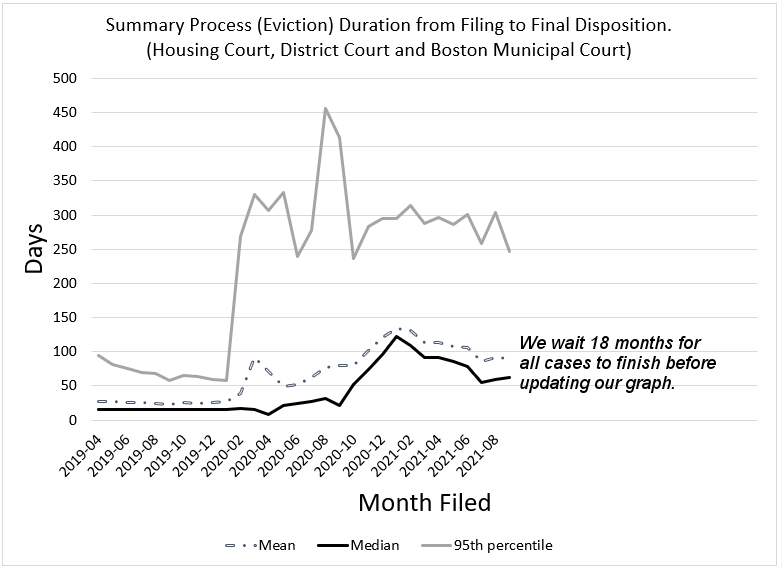Summary Process Duration Tripled Under FY2024 Budget Proposal
| . Posted in News - 4 Comments
Read our latest piece at Tell Your Rep. and Senator: Don’t Band-Aid Rental Assistance and Triple Court Duration.
On Wednesday, April 26, the House approved a Fiscal Year 2024 budget amendment that would restore a pandemic law. This law tripled summary process (“eviction”) duration. We are asking members and the general public to contact their senators and ask that the language of House Budget Outside Section 28 be removed.

Summary process is the legal process by which landlords access rental assistance or enforce tenancies. Two-thirds of summary process cases are known to end with a renter remaining in their home (not evicted). It’s suggested that up to 90% end this way but the data is fuzzy. One thing isn’t fuzzy: the courts are going three times slower than ever. The graph ends mid-2021 because we are still waiting for cases filed then to finish before we add them. Eviction Data CC BY-SA 4.0 MassLandlords.
A change as sweeping as this should be put through normal legislative process, including hearing, so that the concerns of renters and landlords alike can be heard. The laws should be fair for everyone, but this proposed law is not.
In a nutshell, the proposed law would pause nonpayment eviction cases while an application for rental assistance is pending. In principle, we are all fine with this. No one should be evicted while the safety net does its job. Fewer than one-third (possibly only one-tenth) of all summary process filings ever result in an eviction.
In practice, the safety net has failed so devastatingly that in December 2021, MassLandlords filed suit against the Department of Housing and Community Development. Their affidavit shows that they lost to supervision 47,000 of the 151,000 applications for rental assistance. These are believed to be printed out on paper, stored in boxes and scattered among the agents of the commonwealth. This litigation is ongoing.
Meanwhile, landlords, renters and the courts alike waited in limbo for a response that would never come. Tens of thousands of applications timed out. Average summary process duration increased from 25 days to 94 days. Half of all summary process cases used to be resolved in 15 days, but now suddenly half of all cases were being resolved in 64 days. Ninety-five percent of cases used to be resolved in 62 days. But under this law, 95% of cases were resolved in 288 days.
This law lapsed after March 31, 2023. It was right to lapse it. It was papering over gaping holes in our safety net. Rental assistance and court delays caused small housing providers to go out of business at twice the normal rate.
But it was wrong to lapse it without an alternative. There is a legitimate need for a safety net. In Massachusetts, we are in a good position to lead by example. Our safety net stopped tens of thousands of people from being evicted during the pandemic.
Pausing the courts to wait for rental assistance without simultaneously fixing rental assistance will ultimately destabilize landlords and renters alike. If the rental assistance is never going to arrive, the law hurts everyone and helps no one.
MassLandlords staff are standing by to assist with safety net reform (indeed, we have already filed separate legislation to do this).
Please ask your senator to strike this language from the senate budget and to strike it from the conferenced budget.
Please strike budget outside section 28 tripling summary process case duration.




